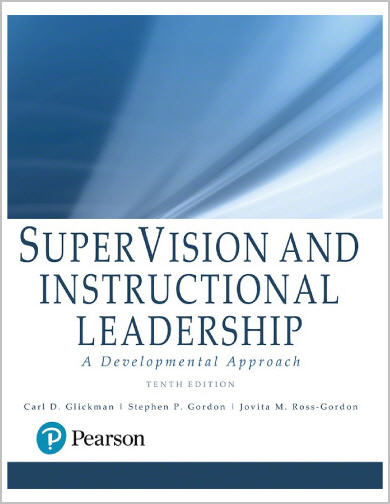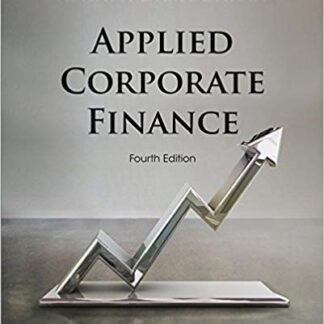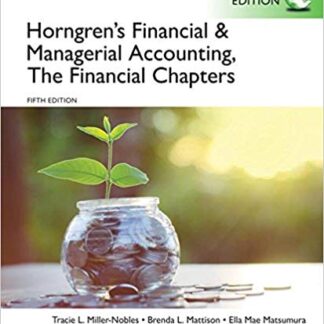Description
SuperVision and Instructional Leadership: A Developmental Approach 10th Edition by Carl D. Glickman, ISBN-13: 978-0134449890
[PDF eBook eTextbook] – Available Instantly
- Publisher : Pearson; 10th edition (January 8, 2017)
- Language : English
- 528 pages
- ISBN-10 : 0134449894
- ISBN-13 : 978-0134449890
NOTE: This eBook is a standalone eBook and will not include any access codes.
The new edition of SuperVision and Instructional Leadership continues the innovative approach that has made it so widely popular, and includes a number of new content changes that bring the subject matter thoroughly up to date. Long recognized as a leading text in the field, this book calls for a collegial approach to instructional supervision; considers the knowledge necessary for successful supervision; discusses interpersonal skills, including different approaches to supervision and how they are used in developmental supervision; presents the technical skills of supervision, such as observing, assessing, planning, implementing, and evaluating; describes the technical tasks of supervision; and deals with the cultural tasks of supervision. A variety of learning aids ensure understanding of the theories and concepts.
Table of Contents:
About the Authors
Preface
New to This Edition
To the Instructor
Brief Contents
Contents
part 1 Introduction
chapter 1 SuperVision for Successful Schools
Learning Outcomes for This Chapter
Questions to Reflect On as You Read This Chapter
SuperVision: A New Name for a New Paradigm
Supervisory Glue as a Metaphor for Success
New Roles for Supervisors and Teachers
Supervision and Moral Purpose
Organization of this Book
Reflective Exercise
part 2 Knowledge
chapter 2 The Norm: Why Traditional Schools Are as They Are
Learning Outcomes for This Chapter
Questions to Reflect On as You Read This Chapter
The Work Environment or Culture of Schools: The Legacy of the One-Room Schoolhouse
Isolation
Psychological Dilemma and Frustration
Routine of the Teaching Career
Inadequate Induction of Beginning Teachers*
Inadequate Resources
Difficult Work Assignments
Unclear Expectations
Sink-or-Swim Mentality
Reality Shock
Effects of Environmental Difficulties
Inequity
Unstaged Career
Lack of Dialogue about Instruction
Lack of Involvement in Schoolwide Curricular and Instructional Decisions
Conservatism
Cultures Within Cultures
Looking Deeper: The Newtonian Paradigm and Traditional Schools
Atomism
Prediction and Control
Objective Measurement
Connecting the Dots: The Newtonian Paradigm and the Traditional School Environment
The Need to Move Beyond the Newtonian Paradigm
Reflective Exercise
chapter 3 The Dynamic School
Learning Outcomes for This Chapter
Questions to Reflect On as You Read This Chapter
Shared Leadership, Collegiality, and Collaboration
A Cause Beyond Oneself
Professional Development
Positive Learning Climate
Authentic Curriculum, Instruction, and Assessment
Democracy
Inquiry
Cultural Responsiveness
Partnerships and Networks
Beyond Newtonianism: The Quantum Paradigm and Dynamic Schools
Uncertainty and Potentiality
Complementarity
Entanglement
Quantum Observation and Measurement
Holism
Connecting the Quantum Paradigm with the Dynamic School
Closing Question
Reflective Exercise
chapter 4 Adult and Teacher Development Within the Context of the School
Learning Outcomes for This Chapter
Questions to Reflect On as You Read This Chapter
Adults as Learners
Intelligence and Wisdom
Theories of Adult Learning
Andragogy
Self-Directed Learning
Heutogogy
Transformational Learning
Situated Learning and Communities of Practice
Holistic Adult Learning
Critical Perspectives on Adult Learning
Teachers as Adult Learners
Adult and Teacher Development
Stage Theories of Adult and Teacher Development
Cognitive Development
Moral Development
Levels of Consciousness
Stages of Concern
Integrating Stage Development Theories
Life Cycle Development, Teachers’ Life Cycles, and the Teaching Career
Transition Events
Role Development
Beyond Universal Conceptions of Development: The Sociocultural Context of Adult Development
The Role of Gender in Adult Development
The Role of Race and Ethnicity in Adult Development
Review of Adult/Teacher Development Models
Development: Ebb and Flow
Reflective Exercise
chapter 5 Reflections on Educational Beliefs, Teaching, and Supervision
Learning Outcomes for This Chapter
Questions to Reflect On as You Read This Chapter
Beliefs, Goals, and Effective Teaching
Beliefs About Education
Supervisory Beliefs
Supervisory Platform as Related to Educational Philosophy
Essentialism
Experimentalism
Existentialism
Checking your own Supervisory Beliefs
What Does Your Belief Mean in Terms of Supervisor and Teacher Responsibility?
Educational Philosophy, Teachers, Supervisors, and Supervisory Approach
Where You Stand Depends on Where You Sit: Effects of Culture on Beliefs
Reflective Exercise
part 3 Interpersonal Skills
chapter 6 Supervisory Behavior Continuum: Know Thyself
Learning Outcomes for This Chapter
Questions to Reflect On as You Read This Chapter
Outcomes of Conference
Valid Assessment of Self
Johari Window
Introductory Activity on the Johari Window
Cognitive Dissonance
Comparing Self-Perceptions with Others’ Perceptions
Comparing Self-Perceptions to Recorded Behaviors
360-Degree Feedback
Reflective Exercise
chapter 7 Directive Control Behaviors
Learning Outcomes for This Chapter
Questions to Reflect On as You Read This Chapter
Characteristics of Teachers Best Matched with Directive Control Behaviors
Directive Control Sequence of Behaviors
A History of Overreliance on Control
Issues in Directive Control
When to use Directive Control Behaviors
Moving from Directive Control Toward Directive Informational Behaviors
Reflective Exercise
chapter 8 Directive Informational Behaviors
Learning Outcomes for This Chapter
Questions to Reflect On as You Read This Chapter
Characteristics of Teachers Best Matched with Directive Informational Behaviors
Directive Informational Sequence of Behaviors
Comparing Directive Control and Directive Informational Statements
Issues in the Directive Informational Approach
When to use Directive Informational Behaviors
Moving from Directive Informational Toward Collaborative Behaviors
Reflective Exercise
chapter 9 Collaborative Behaviors
Learning Outcomes for This Chapter
Questions to Reflect On as You Read This Chapter
Characteristics of Teachers Best Matched with Collaborative Behaviors
Collaborative Sequence of Behaviors
Issues in Collaborative Supervision
When to use Collaborative Behaviors
Moving from Collaborative Toward Nondirective Behaviors
Reflective Exercise
chapter 10 Nondirective Behaviors
Learning Outcomes for This Chapter
Questions to Reflect On as You Read This Chapter
Characteristics of Teachers Best Matched with Nondirective Behaviors
Nondirective Sequence of Behaviors
Initiating Nondirective Supervision
Nondirective, Not Laissez-Faire, Supervision
Issues with Nondirective Supervision
When to use Nondirective Behaviors
Reflective Exercise
chapter 11 Developmental Supervision
Learning Outcomes for This Chapter
Questions to Reflect On as You Read This Chapter
Phase 1: Choosing the Best Approach
Phase 2: Applying the Chosen Approach
Phase 3: Fostering Teacher Development
Not Algorithms, but Guideposts for Decisions
Case Studies on Developmental Supervision
Case Study One
Case Study Two
Case Study Three
Goal
Case Study Four
Discussion of the Four Case Studies
Reflective Exercise
part 4 Technical Skills
chapter 12 Observing Skills
Learning Outcomes for This Chapter
Questions to Reflect On as You Read This Chapter
Quantitative Observations
Categorical Frequency Instrument
Performance Indicator Instruments
Visual Diagramming
Qualitative Observations
Verbatim and Selected Verbatim
Detached Open-Ended Narrative
Participant Open-Ended Observation
Focused Questionnaire Observation
Tailored Observation Systems
Schoolwide Classroom Observation
Review of Types and Purposes of Observation
Trends and Cautions Regarding Observation
Technology-Enhanced Observation
Collaborative Walkthroughs
Cautions Concerning Observation
Reflective Exercise
chapter 13 Assessing and Planning Skills
Learning Outcomes for This Chapter
Questions to Reflect On as You Read This Chapter
Personal Improvement
Assessing Time
Changing Time Allocations: Planning
Instructional Improvement Within the Organization
Ways of Assessing Need
Eyes and Ears
Schoolwide Observation
Official Records
Review of Teacher and Student Work Products
Third-Party Review
Multiple-Choice Survey
Written Open-Ended Survey
Ranking Survey
Delphi Technique
Nominal Group Technique
Analyzing Organizational Needs
Cause-and-Effect Diagrams
Flowcharts
Pareto Charts
Planning
Affinity Diagrams
Process Decision Program Chart
Gantt Charts
Combining Assessment and Planning: Force Field Analysis
Cautions Concerning Planning
Reflective Exercise
chapter 14 Implementation and Evaluation Skills
Learning Outcomes for This Chapter
Questions to Reflect On as You Read This Chapter
Stages of Implementation
Readiness
Installation
Initiation
Full Operation
Continuation and Renewal
Factors that Affect Implementation
Implementation at the Individual Level
Evaluation of Instructional Improvement Efforts
The Intersection of Instructional Supervision and Program Evaluation
Judgments
Two Types of Program Evaluation: Formative and Summative
Formative Program Evaluation
Summative Program Evaluation
Who will Evaluate?
What Questions Need to be Answered?
What Data will be Gathered and How?
How Will the Data Be Analyzed?
How Will the Evaluation Be Reported?
Program Evaluation and Teacher Empowerment
Purposes
Support
Process
Reflective Exercise
part 5 Technical Tasks of Supervision
chapter 15 Direct Assistance to Teachers
Learning Outcomes for This Chapter
Questions to Reflect On as You Read This Chapter
Clinical Supervision
Step 1: Preconference
Step 2: Observation
Step 3: Analysis and Planning
Step 4: Postconference
Step 5: Critique
The Relationship of Clinical Supervision with Other Processes
Comparing Clinical Supervision with Evaluation of Teaching
Integrating Clinical Supervision and Developmental Supervision
Peer Coaching
Purpose
Preparation
Scheduling
Troubleshooting
Mentoring
Mentor Selection, Preparation, and Support
Matching Mentors with Beginners
Mentor Support for the Beginning Teacher
Benefits of Mentoring
Reciprocal Mentoring
Reverse Mentoring
Using Direct Assistance to Improve Classroom Culture
Reflective Exercise
chapter 16 Evaluation of Teaching
Learning Outcomes for This Chapter
Questions to Reflect On as You Read This Chapter
The New Wave of Evaluation Systems: From the Frying Pan to the Fire?
Summative and Formative Evaluation
Why Summative and Formative Evaluation of Teaching Should Be Separate
How to Separate Summative and Formative Evaluation
Suggestions for Summative Evaluation
Suggestions for Formative Evaluation
Using Rubrics
Classroom Observations
Videos
Review of Student Work
Peer, Student, and Parent Feedback
Visits to Other Teachers’ Classrooms
Individualized Improvement Plans
Self-Reflection
Portfolio Development
Contextualizing and Personalizing Formative Evaluation
Beyond Evaluation of Individual Teaching
Team Evaluation of Teaching
Schoolwide Evaluation of Teaching
Reflective Exercise
chapter 17 Group Development
Learning Outcomes for This Chapter
Questions to Reflect On as You Read This Chapter
Stages of Group Development
Forming
Storming
Norming
Performing
Adjourning
Characteristics of Effective Groups
Group Member Roles
Task Roles
Person Roles
Dysfunctional Roles
Dealing with Dysfunctional Members
Applying Developmental Supervision to Groups
Resolving Conflict
Preparing for Group Meetings
Agendas
Establishing Ground Rules
Guided Discussion
Reflective Exercise
chapter 18 Professional Development
Learning Outcomes for This Chapter
Questions to Reflect On as You Read This Chapter
Characteristics of Successful Professional Development Programs
Integrating Schoolwide, Group, and Individual Professional Development
Alternative Professional Development Formats
Stages of Professional Development
Evaluating Professional Development
Teachers as Objects or Agents in Professional Development
Reflective Exercise
chapter 19 Curriculum Development
Learning Outcomes for This Chapter
Questions to Reflect On as You Read This Chapter
Legislated Learning
State-Mandated Curriculum
High-Stakes Tests and the Curriculum
Curriculum Development as a Vehicle for Enhancing Collective Thinking about Instruction
What Should Be the Purpose of the Curriculum?
What Should Be the Content of the Curriculum?
How Should the Curriculum Be Organized?
In What Format Should the Curriculum Be Written?
Behavioral-objective format
Webbing
Results-only format
Curriculum Format and Teacher Choice
Relationship of Curriculum Purpose, Content, Organization, and Format
Levels of Teacher Involvement in Curriculum Development
Level 1: Imitative maintenance
Level 2: Mediative
Level 3: Creative-generative
Integrating Curriculum Format with Developers and Levels of Development
Matching Curriculum Development with Teacher Development
The Curriculum and Cultural Diversity
Curriculum Mapping—and Remapping
Developing Curriculum Units: Understanding by Design
Stage 1: Identify desired results
Stage 2: Determine evidence
Stage 3: Develop learning plan
Keys to success of learning by design
Reflective Exercise
chapter 20 Action Research: The School as the Center of Inquiry
Learning Outcomes for This Chapter
Questions to Reflect On as You Read This Chapter
How Is Action Research Conducted?
Characteristics of Successful Action Research
Expanding Boundaries: Alternative Approaches to Action Research
Interpretive Action Research
Critical Action Research
Appreciative Inquiry
Shared Governance for Action Research
Premises
Principles
Operational Model
The Formal Groups
Decision-Making Procedures
Implementation
Suggestions for Assisting Action Research
Reflective Exercise
part 6 Cultural Tasks of Supervision
chapter 21 Facilitating Change
Learning Outcomes for This Chapter
Questions to Reflect On as You Read This Chapter
Chaos Theory
Nonlinearity
Complexity
Butterfly Effect
Fractals
Feedback Mechanisms
Turbulence
Strange Attractors
Postmodern Theory
Education Change Theory
Capacity
Commitment
Leadership
Evolutionary Planning
Problem Solving
Support
Coherence
Norms of Continuous Improvement
Making Connections
Changing the Conditions of Teaching
Reflective Exercise
chapter 22 Addressing Diversity
Learning Outcomes for This Chapter
Questions to Reflect On as You Read This Chapter
Achievement Gaps Among Economic, Racial, and Ethnic Groups
A Societal or a School Problem?
Cultural Clashes
Culturally Responsive Teaching
Culturally Responsive Schools
Teacher Development
School Development
Collaboration with Families and the Community
Gender Equity
Equity for Sexual and Gender Minorities
Equity for Students with Disabilities
Overarching Patterns
Connecting the Technical Tasks of Supervision to Cultural Responsiveness
Reflective Exercise
chapter 23 Building Community
Learning Outcomes for This Chapter
Questions to Reflect On as You Read This Chapter
Democratic Community
Moral Community*
Care
Wholeness
Connectedness
Inclusion
Justice
Peace
Freedom
Trust
Empowerment
Professional Learning Community
Community of Inquiry
Engagement with the Larger Community
School-Based and School-Linked Community Service
Community Development
The Community as a Learning Environment
Service Learning
Place-Based Learning
Democratic Learning
Five Attributes, One Community
Conclusion
Reflective Exercise
appendix A Educational Philosophy Q Sort*
Rating Guide for the Educational Philosophy Q-Sort
Making Sense of Your Ratings
appendix B Review of Interpersonal Behavior in the Four Supervisory Approaches
References
Name Index
Subject Index
Carl D. Glickman is Professor Emeritus of Education at the University of Georgia. He began his career as a Teacher Corp intern in the rural south and later was a principal of award-winning schools in New Hampshire. At the University of Georgia he and colleagues founded the Georgia League of Professional Schools, a nationally validated network of high-functioning public schools dedicated to the principles of democratic education. He is the author or editor of 14 books on school leadership, educational renewal, and the moral imperative of education.
Stephen P. Gordon is a professor of Education and Community Leadership at Texas State University. He is author of the book Professional Development for School Improvement, co-author of the books The Basic Guide to Supervision and Instructional Leadership, and How to Help Beginning Teachers Succeed, and editor of the books Collaborative Action Research and Standards for Instructional Supervision: Enhancing Teaching and Learning. Dr. Gordon, the former director of the National Center for School Improvement, also was lead consultant for the ASCD video series Improving Instruction through Observation and Feedback.
Jovita M. Ross-Gordon is a professor of Adult, Professional and Community Education at Texas State University Dr. Ross-Gordon is the author, editor, or co-editor of several books including the 2010 Handbook of Adult and Continuing Education. She has also published numerous chapters and articles on the teaching and learning of adults, particularly in the setting of higher education. She is currently co-editor-in-chief of New Directions for Adult and Continuing Education, and has served in numerous leadership positions with professional organizations focusing on adult education.
What makes us different?
• Instant Download
• Always Competitive Pricing
• 100% Privacy
• FREE Sample Available
• 24-7 LIVE Customer Support






